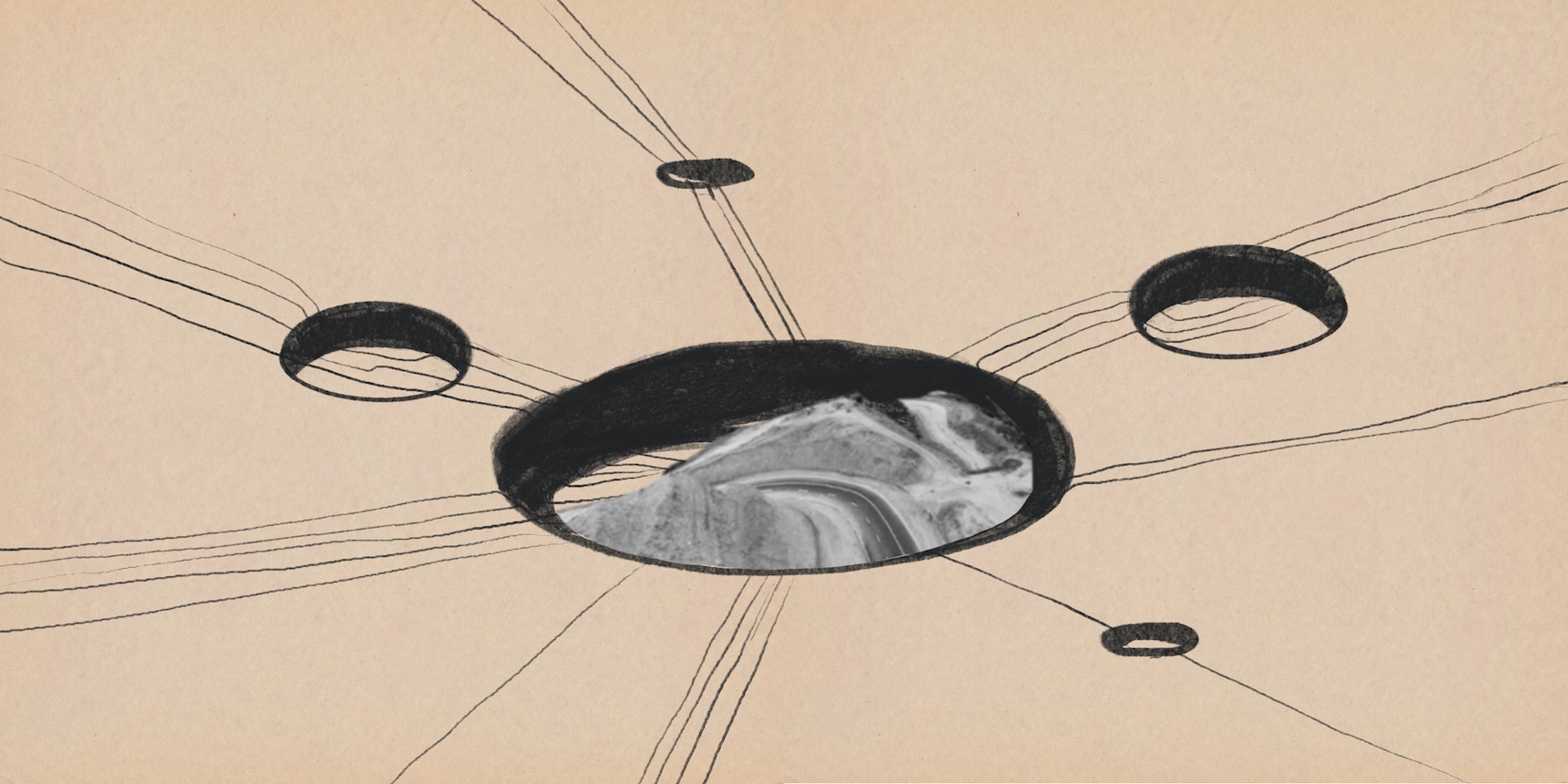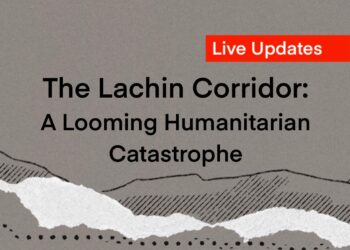
For more than a month, Artsakh has been cut off from the world by the joint will of Azerbaijan and Russia, which for different and even contradictory reasons have decided to asphyxiate the 120,000 Armenians of the Republic, including 30,000 children. And in the great silence of the international community. Why? Because Artsakh is the blind spot of the peace negotiations.
Azerbaijan is unhappy, it blocks the Lachin Corridor. Russia is impatient, it blocks the Lachin Corridor. The West is indifferent, it turns a blind eye to those who block the Lachin Corridor. What has been happening since December 12, 2022, when so-called Azerbaijani environmentalists came to block the Lachin crossing to oppose the operation of a molybdenum mine in free Artsakh? Ecologists, most of whom are soldiers disguised as green men because as soon as the weather cooled the nature lovers left, and they were replaced by armed men… in front of Russian blue helmets, silent observers of a staging orchestrated by Azerbaijani President Ilham Aliyev.
There are two reasons for the blockade of the corridor, and these two reasons are related to the two peace approaches on the negotiating table between Armenia and Azerbaijan. On the one hand, a Western approach (Americans, Europeans and the French) which defends the idea of the territorial integrity of Armenia and Azerbaijan, but without the so-called “Zangezur corridor”, regardless whether it is under Azerbaijani control or Russian, nor a status for Nagorno-Karabakh, which would be administered by Baku. The goal of Westerners is to strengthen the sovereignty of the states of the South Caucasus, far from any influence of Russia, whose difficulties are accumulating in Ukraine without having yet dropped to its knees. The Western method differs from the more hands-on Russian approach, since the Westerners only encourage the parties to practice the language of peace without intervening directly in the talks; the Western goal being to reduce the influence of Russia in the region. On the other hand, is the Russian approach which also defends the principle of the territorial integrity of these two former Soviet Republics, according to the Alma-Ata agreements of December 21, 1991, signed among the 15 former members of the USSR and constituting the Commonwealth of Independent States (CIS). But this recognition has two conditions: restoration of communication between the western regions of Azerbaijan and Nakhichevan through Armenia under the control of the Border Guard Service bodies of the FSB of Russia, in accordance with the statement of November 9, 2020 which ended the 44-day war, and the determination of the status of Nagorno-Karabakh after the signing of a peace agreement between Armenia and Azerbaijan. In this configuration, Russia retains control of the South Caucasus and allows the opening of a land route linking Russia to Turkey via Baku and Yerevan; a way of better circumventing the Western sanctions put in place since the war in Ukraine launched on February 24, 2022. The goal of the Russians being also to reinforce the process of the de-Westernization of the South Caucasus, spurred by the 2008 Russo-Georgian war and by the sidelining of the OSCE Minsk Group (France, United States, Russia) during the Russian-Turkish mediation at the end of the 2020 Artsakh War.
Which of the two approaches to choose? Armenia does not respond and waits. But by taking its time, Yerevan irritates and annoys Baku and Moscow who will have to decide: Will they work in a concerted way or not? Or will they ignore it, to take action? But let it be said: Russians and Azerbaijanis are not unblocking the Lachin Corridor for the same reason. On the contrary: Baku receives a refusal from Moscow when Aliyev proposes the establishment of a so-called “Zangezur corridor” under its control. Apart from its faithful Turkish ally, all the powers are saying “No!” to it. Moscow is in the lead, therefore, because Russia has given guarantees to Armenia that its territorial integrity will not be violated by Azerbaijan. This is why Baku and Moscow blame each other for closing the Lachin Corridor. Baku says: “No Zangezur corridor, well, no Lachin Corridor,” while Moscow threatens Yerevan: “Until you respond favorably to the Russian plan, we will close the Lachin Corridor.” The result: Artsakh is blocked. And since, until proven otherwise, the West has not planned anything for Artsakh, which has become the blind spot of the peace negotiations, Westerners are content with a few calls to unblock the corridor for humanitarian reasons – although the root of the problem is the status of Nagorno-Karabakh.
The debate in Armenia is therefore the subject of friction between the regime of Nikol Pashinyan, more sensitive to the Western approach in the name of the sovereignty of the Republic of Armenia and calling on Artsakh to temper its claims on the one hand, and the parliamentary opposition, on the other, which leans in favor of the Russian plan whereas this one attests the end of the independence of Armenia, which will become in the long-term the third segment of the Belarusian-Russian union. So independence or unification of the territories? The West or Russia? Sovereign Armenia or Armenia, a vassal of the Russian Empire? The two approaches have in common only the idea of a peace of inclusion, whereas Azerbaijan advocates a peace of punishment and Armenia plays the card of a peace of law (right to sovereignty and political rights and security of Artsakh Armenians). In short, where are we exactly?
Since the end of the war, the South Caucasus has been the scene of an unprecedented diplomatic ballet. Russia knows it cannot go too far in its retaliation against its Armenian “ally”. Denouncing the “dangerous” initiatives of the West which “aim to torpedo its efforts between Armenia and Azerbaijan,” Moscow, with difficulties in Ukraine, pushes the CSTO to deploy an observation mission in Armenia along the border with Azerbaijan. Without forgetting that Moscow has made it known that by allowing the Russian-Armenian oligarch, Ruben Vardanyan, to settle in Stepanakert where he became Minister of State of Artsakh on November 4, 2022, Russia is sending a message to the Armenians that Moscow pays the greatest attention to the cause of Nagorno-Karabakh. For its part, the West, which since Moscow’s silence after the Azerbaijani aggression against Armenia in September 2022, has set its foot in the door of Russian-Armenian strategic relations, calls for support for Armenian democracy. The United States encouraged Turkey to lift the ban on air cargo to Armenia; and the European Union, a partner of Azerbaijan, wants to ensure peace in the region, by preparing to deploy a new permanent observation mission in Armenia along the border with Azerbaijan.
What is Yerevan doing? Armenia jumped at the opportunity of increased investment from the United States to counterbalance Russian pressure but also the threat that Baku continues to pose to its sovereignty, while maintaining its membership in the CSTO, just to maintain balance. Considering that Azerbaijan occupies its territory and poses an existential threat – the Biden administration and the Erdogan regime trying to reduce their dispute, Ankara plans to normalize its relations with Yerevan – Armenia is betting on American pressure on Baku to prevent it from attacking and at the same time neutralize Russia, which will no longer be able to use Azerbaijan to weaken it. At the UN Security Council session requested by Armenia, which aimed to condemn Azerbaijan’s aggression, the 15 members were unable to agree on the content of a final declaration – Russia accusing France of its refusal to include in the text the elements relating to the progress of Russian diplomacy in this dossier, and vice versa. In the meantime, Armenia raises the alarm of the risk of ethnic cleansing of the Armenians of Nagorno-Karabakh and records the reluctance of the international community — if it exists — to provide assistance for the physical safety of a population in danger of death.
In this stalemate, which has lasted for more than a month, Azerbaijan could be forced to withdraw itself from the conditions of the November 9, 2020 statement. Blocking the Lachin Corridor could only be a first step: Baku is aware that the mandate of the Russian peacekeeping contingent expires in 2025 and by preparing for this turning point, it could be tempted to resort to force and complete the issue of the “Republic of Artsakh” and the “Zangezur corridor” project. Azerbaijan has the military means, but what about its will? Could Iran, stuck in an unprecedented internal crisis, not outsource it by multiplying the provocations against Baku? It would also be a new test for the West, already mobilized behind democratic Ukraine. It remains to be seen, finally, if Russia would remain idly by in the event of a coup against its Armenian ally. In the meantime, 120,000 people, including 30,000 children, are hostages to cynicism in international relations.
News updates
Also see
Armenia, Russia, France and the Changing Dynamics at the UN Security Council
Why has the UN Security Council failed to react in a meaningful way to the Nagorno-Karabakh conflict? Hovhannes Nazaretyan looks at some of the possible reasons.
Read moreTurning the Tables: The UNSC Emergency Meeting on the Blockade of Nagorno-Karabakh
The United Nations Security Council’s emergency meeting regarding the blockade of the Lachin corridor demonstrated a remarkable shift in the international community’s reaction to the Armenia-Azerbaijan and Nagorno-Karabakh conflicts.
Read moreStrategic Boldness in the Face of Baku’s Obstructionism
Baku does not want an equitable peace, the West struggles to advance the negotiations, and Moscow prefers freezing the process to create a new status quo it can control. Yerevan will need to enhance its bargaining abilities by engaging in asymmetrical aggressive bargaining.
Read more




